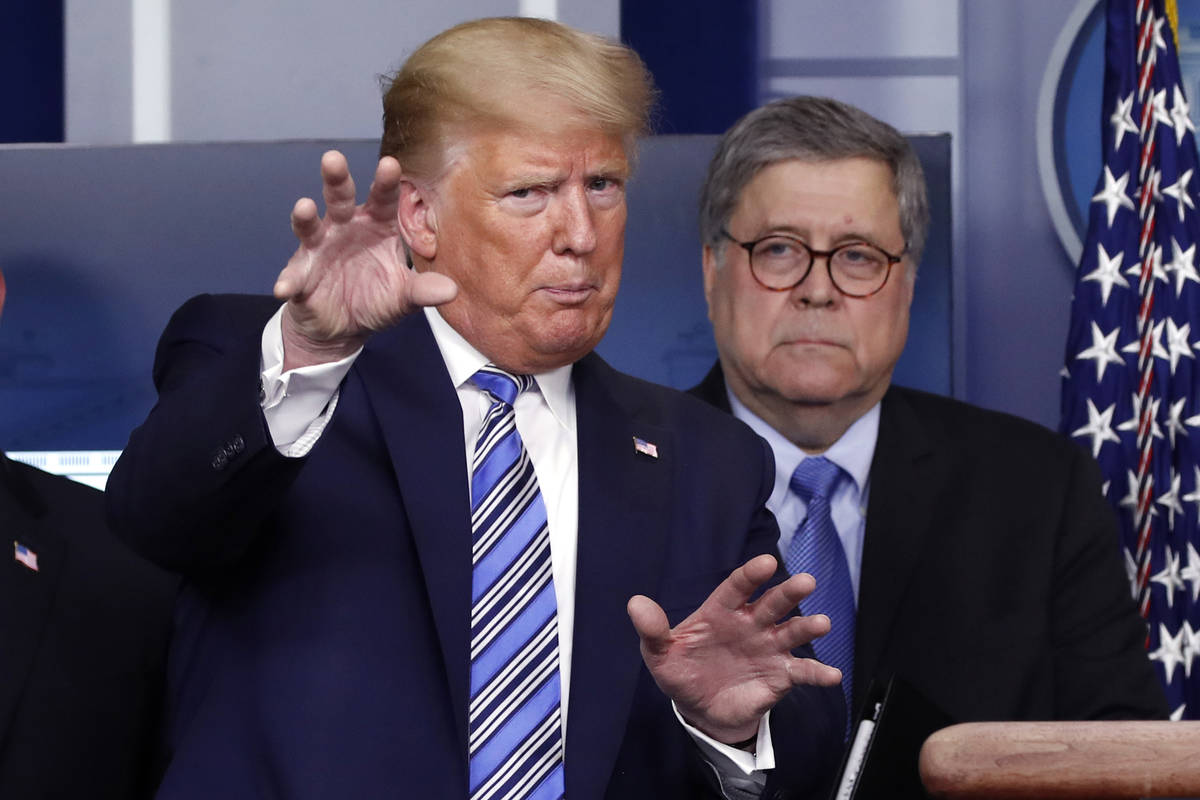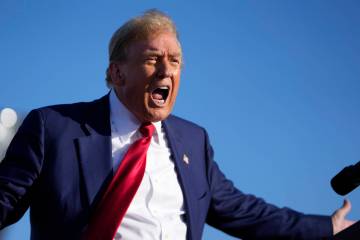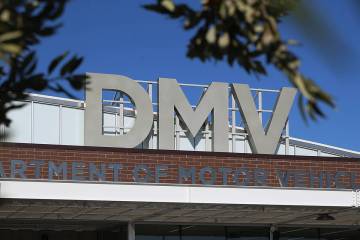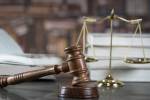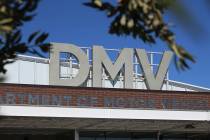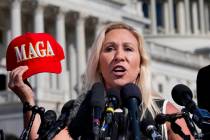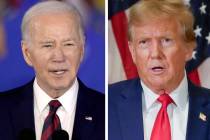Trump says ‘fraud,’ but officials say mail elections are secure
WASHINGTON — As state and local election officials work to make voting less risky in the midst of the coronavirus outbreak, President Donald Trump is pushing back.
On Twitter, Trump has warned that voting by mail could make 2020 the most “rigged” election in U.S. history.
Attorney General William Barr warned that mail-in voting could open the “floodgates of fraud.” On Fox News’ “Sunday Morning Futures,” Barr went so far as to say that “a foreign country could print up tens of thousands of counterfeit ballots, and (it would) be very hard for us to detect.”
And they’re pointing to Nevada to make their point.
Asked last month about Trump’s claims on voting by mail, press secretary Kayleigh McEnany said, “Nevada mass-mailed them out to voter rolls that were piling up in apartment complexes, outside of apartment complexes in Las Vegas, sitting around in trash cans. This is how we’re protecting ballots? It’s extraordinary.”
McEnany also retweeted a Review-Journal story that had a photo of openly discarded ballots. The article quoted a postal worker who said many absentee ballots were “no good” because the recipients are dead or had moved.
According to the @reviewjournal, there has been an influx of absentee ballots that were “NO GOOD”.
A 36 year-veteran carrier with USPS said recipients “all moved or died”.
She kept 65 ballots from just her first delivery day‼️ https://t.co/VwZ337vZCI
— Kayleigh McEnany (@PressSec) May 26, 2020
Is rampant fraud a problem? Not really, responded Wayne Thorley, Nevada’s deputy secretary of state for elections. Thorley has been fielding concerns since Secretary of State Barbara Cegavske and Nevada’s 17 county elections officials decided to conduct the June primary by mail because of COVID-19.
“You can’t just pick up a ballot off the ground and vote with it because of the security procedures we have in place,” Thorley said.
Small-scale fraud
Nevada officials sent out 1.8 million ballots for the primary; 252,776 ballots were returned as undeliverable. Most of those — 201,886 — were in Clark County. Clark was the only county in Nevada to send ballots to both active and inactive voters.
According to Thorley, 491,645 Nevadans cast ballots, but only 480,855 ballots were counted. The largest reason for disqualification of ballots was that the required signatures on the envelope in which the ballot was mailed didn’t match the signature on file with the elections office, or the voter forgot to sign the ballot entirely.
“The claims that there’s no fraud whatsoever in the system, that’s not true,” Thorley noted. “Fraud does happen, but it happens on a very small scale.”
Those who think they can vote more than once in an election should beware. That’s a felony. And those who think it’s easy to simply print up ballots and vote are wrong; Nevada has anti-counterfeiting measures in place to prevent fraud.
Stories of fraud do pop up. This month, the New Jersey attorney general charged four individuals, including a city councilman and a councilman-elect, with voter fraud in the May mail-in election in Paterson.
According to television news station 4NewYork, residents had complained about postal workers leaving stacks of ballots in apartment lobbies, and 300 ballots reportedly were bundled together then dropped in the mail. Election officials set aside 800 mail ballots, or 6 percent of the vote.
Yes, Loyola Law School professor Jessica Levinson acknowledged, voter fraud happens, but it was hard for her to describe how an organization could rig election results for a presidential contest. The map is too big.
“You would basically have to pick five or six states that actually matter in the election,” she said.
Then you’d have to find the counties in those states that might be more susceptible to fraud, get copies of the voter rolls and make sure that the people whose identities you use don’t vote or intercept their true ballots.
“It would have to be like one of those ‘Oceans Eleven’ movies where there’s no way that they can actually do that,” Levinson said.
So why are Trump and Barr bad-mouthing voting by mail?
“Trump and Barr both feel that they would politically benefit from lower voter turnout,” Levinson responded.
If you undermine the public’s faith in the system, fewer Americans participate in the election.
As for their remarks about a foreign government, Levinson sees assertions that foreign governments could print phony ballots as an invitation for foreign mischief.
And if Trump wins re-election in 2020, she noted, he can say, “Can you believe I won even though there was rampant fraud?”
No partisan tilt
Trump has made it clear that he sees mail-in voting as a threat to his re-election. In April, Trump warned that if all states voted by mail, “you’d never have a Republican elected in this country again.”
Researchers, however, generally have concluded that mail-in voting doesn’t favor either party.
In April, for example, the Stanford Institute for Economic Policy Research collected data from three states that have implemented vote-by-mail policies and found that voting by mail didn’t appear to favor either party’s turnout or vote share.
Republicans aren’t the only partisans willing to throw shade on the election, perhaps with the goal of reducing voter turnout but also in an attempt to taint the legitimacy of the eventual winner.
Despite a bipartisan Senate Intelligence Committee report that found no evidence that Russia changed or manipulated votes in 2016, former Senate Majority Leader Harry Reid told author David Shimer there is “no question” that Russia altered votes in 2016, The Washington Post reported.
“I think one reason the elections weren’t what they should have been was because the Russians manipulated the votes,” Reid said. “It’s that simple.”
In 2012, Reid proclaimed without evidence that Republican presidential nominee Mitt Romney hadn’t paid taxes in 10 years, daring Romney to prove him wrong by releasing his tax returns. Questioned later about the tactic by a reporter, Reid responded, “Romney didn’t win, did he?”
After efforts to publicize the discarded ballots in Las Vegas, did the Nevada Trump campaign find fraud?
Keith Schipper, the campaign’s Nevada spokesman, replied that thousands of ballots had been tossed because of signature issues. Republicans opposed not only mail-in voting but also demands in a lawsuit filed by state and national Democrats that Nevada loosen signature verification and allow for so-called ballot harvesting, or the collection of ballots from multiple voters so they can be turned in en masse.
“We’re fighting to protect these safeguards protecting the laws on the books,” Schipper said. Those laws, Schipper added, are “there for a reason.”
Democrats, however, argue that they are trying to get more people to exercise the franchise.
“Democrats are committed to fighting for an expanded vote-by-mail process that allows for voter assistance for those who are unable to return their ballots and ensures every registered voter receives a ballot, an extended cure period for absentee ballots, enough well-organized and hygienic polling locations, and a signature review process that involves several layers of review to ensure ballots aren’t arbitrarily rejected,” Nevada State Democratic Party spokeswoman Molly Forgey said in a statement. “Baseless claims of vote fraud are really just attempts at voter suppression intended to undermine the integrity of our elections.”
And Thorley told the Review-Journal that “signature verification is one of the most important security procedures we have in place.”
Issues in other places
When news reports say there is no evidence of voter fraud in America, Pete Hutchison, president of the conservative Landmark Legal Foundation, points to North Carolina, where a GOP operative was charged over accusations of harvesting absentee ballots during a 2018 House election, which led to an election do-over.
Hutchison’s issue with voting by mail is that it mail-in ballots are the easiest targets for fraud, a conclusion found by the bipartisan 2005 report of the Commission on Federal Election Reform, chaired by former President Jimmy Carter and former Secretary of State James Baker III.
Hutchison also voiced philosophical objections to voting by mail.
“Our elections system is designed to be done in public but also in secret,” Hutchison added. When Americans vote at a public polling place, they cast secret ballots. With voting by mail, people receive their ballots in private, and other people have access before, during or after the act of voting.
The public polling place, he argued, “should not be thrown out because we have a pandemic,” and Cegaskve and county officials were wrong to “set aside statutory requirements,” even if a federal judge twice upheld the decision. The rules were changed for the primary only.
As for November, Hutchison said that “this already has proven to be the year of lawlessness” in elections and “lawlessness on the streets,which has become very fashionable. So why not? I mean it’s all about results, isn’t it? And this Trump guy has got to go.”
It won’t help that after Americans vote in the presidential election, many state officials aren’t likely to have vote results for days, even weeks. In Nevada, valid ballots can be received up to a week after they are mailed, so long as they are postmarked by Election Day.
And when it’s over, after questions have been raised about the integrity of the election, the losing side may not be inclined to believe that the next president really won.
Levinson said that is why every election official has a simple prayer about each election: “Let it not be close.”
Contact Debra J. Saunders at dsaunders@reviewjournal.com or 202-662-7391. Follow @DebraJSaunders on Twitter.



